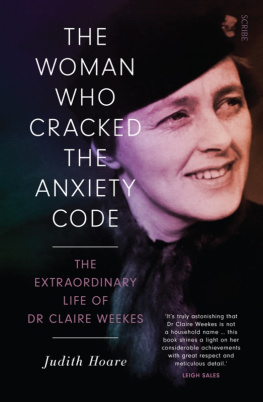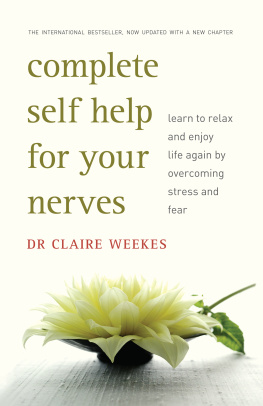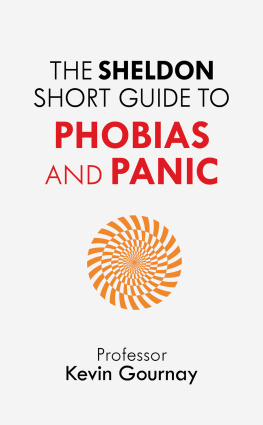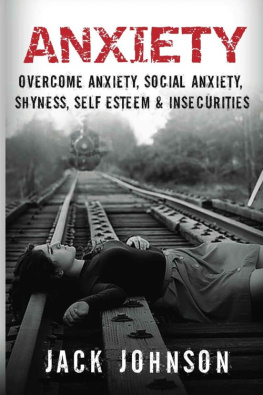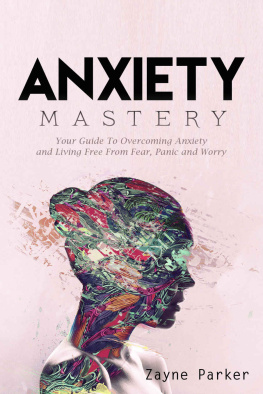
THE WOMAN WHO CRACKED THE ANXIETY CODE
Judith Hoare is a journalist who worked for the Australian Broadcasting Corporation and The Australian Financial Review . She started her career on Chequerboard , a trailblazing social-issues program in the 1970s, and then moved to AFR , reporting on federal politics in Canberra. She shifted to features writing, to eventually specialise in editing long-form journalism for the newspaper, and was appointed deputy editor, features, in 1995, a position she held for 20 years.
Scribe Publications
2 John Street, Clerkenwell, London, WC1N 2ES, United Kingdom
1820 Edward St, Brunswick, Victoria 3056, Australia
3754 Pleasant Ave, Suite 100, Minneapolis, Minnesota 55409 USA
First published by Scribe 2019
Copyright Judith Hoare 2019
All rights reserved. Without limiting the rights under copyright reserved above, no part of this publication may be reproduced, stored in or introduced into a retrieval system, or transmitted, in any form or by any means (electronic, mechanical, photocopying, recording or otherwise) without the prior written permission of the publishers of this book.
The moral right of the author has been asserted.
Self Help for Your Nerves ; Peace from Nervous Suffering ; Simple, Effective Treatment of Agoraphobia ; More Help for Your Nerves ; The Latest Help for Your Nerves ; and other material written by Claire Weekes are copyright Claire Weekes Publications. All quotes used with kind permission.
Extract from Elegy by Seamus Heaney reprinted here with permission of Faber and Faber Ltd.
9781912854165 (UK edition)
9781950354108 (US edition)
9781925713381 (Australian edition)
9781925693751 (e-book)
Catalogue records for this book are available from the National Library of Australia and the British Library.
scribepublications.co.uk
scribepublications.com
scribepublications.com.au
For Jim, Claudia, and Kate
The way we are living,
timorous or bold,
will have been our life.
Seamus Heaney
Contents
Prologue :
Epilogue :
Prologue
The Uncommon Sense of Claire Weekes
On 23 October 1977, a diminutive Australian stepped onto the stage in New York. The audience saw an elderly woman whose regular uniform was a tweed skirt, twin-set, spectacles, and sensible brown lace-up shoes with low heels. Her dark hair was permed and for adornment she preferred a string of pearls.
At the age of 74, Dr Claire Weekes was the guest speaker at the 18th Annual Fall Conference of the Association for the Advancement of Psychotherapy. She was an unusual choice for this gathering as she ranked as an unqualified outsider.
However, Weekes had one measurable claim to fame: her books on anxiety were a global sensation, hitting bestseller lists in the US and the UK. She had found a popular audience by identifying and describing the havoc nervous illness could create and explaining and treating it in a fresh way. Weekes had been invited to address this professional association despite divided opinion over her approach. Many psychiatrists had heard of her methods from their patients, and a number accepted that some patients they had treated unsuccessfully had read her books and felt, if not entirely cured, then on the way to recovery.
Weekes had written the prosaically titled Self Help for Your Nerves in 1962, and, by the time she was standing on the podium in New York over 15 years later, there had been two more books, which were prominently displayed in airports and translated into at least eight languages. For years, the professionals had looked away from, and down on, her work.
The books were slim volumes that explained the nervous system and how it could go awry, how the mind and body were interconnected in arousal, and the trouble this could cause. Yet the clarity of work that drove the books runaway success also repelled professional recognition. Self-help was not yet a genre that inspired psychiatrists attention or respect.
Earlier that year, her third book, Simple, Effective Treatment of Agoraphobia , had been published in the US. It was her first directed at the medical community, and in it she asserted that far from helping their patients, psychoanalysts often made matters worse. She also corrected one of the pre-eminent British psychologists, Dr Isaac Marks, who put agoraphobia before anxiety. Weekes reversed the order, arguing that anxiety or, more specifically, fear came first, and triggered agoraphobia. The profession was on notice that she believed she had the answers to problems they were misconstruing.
As Weekes toured the US from coast to coast, she was interviewed by well-known television talk-show hosts, and countless newspaper articles were written about her work and syndicated across the country.
In a field more familiar with failure, and one riven with division, Weekes achieved success. Indeed, such was the confusion and disenchantment with the lack of progress in treating the mentally ill that in the 1970s a group of psychiatrists launched an anti-psychiatry movement. Their manifesto proclaimed that rather than suffering from mental illness, their patients were victims of society.
Underneath it all was a growing unease with the lack of empirical evidence for any treatment, which invited the question of how to measure success or failure. Yet Weekes had the numbers running in her favour. People bought her books and queued to thank her for saving their lives. She was writing about them. Many chose a religious metaphor to express their gratitude. The books were their bible.
On the podium in New York, Weekes inspired no awe and many in the audience dismissed her as a populist. That she was a medical practitioner and held a doctorate in science as well did not count. She was the author of self-help books, she was not a psychiatrist, and she was in huge demand in the media. Her fame invited critical attention to her lack of specialist credentials, which was enough to wound her reputation in her own profession.
She had one professional advocate, however the New York psychiatrist Dr Manuel Zane. He had founded the first hospital-based phobia and anxiety clinic in the United States, at White Plains, New York, just six years earlier and had seen for himself how the Weekes method worked. Zane had been impressed by the heartfelt response to her books from a number of his own intractable patients, who had been housebound for years.
By the time Zane opened his clinic in 1971, Weekes was already a phenomenon in the field of anxiety. A clinician pioneering his own unorthodox method of treatment, he had an open mind, and saw some common ground in her approach.
He wrote to Weekes in Australia, inviting her to visit his clinic in New York. As a result of his passionate advocacy, she gained wider access to US mental-health professionals. Zane pressed upon his colleagues his view that Weekes had a special and unique understanding of anxiety, particularly panic disorder. Better still, she had an easily understood and demonstrably effective treatment protocol.
With the patronage of Zane among others, Weekes was invited from time to time to address professionals, but she felt their resistance, and some criticised her openly. During at least one of her public lectures, she was keenly aware that psychiatrists in the front row consulted their watches every few minutes. Others talked audibly to each other.
Her speech in New York in 1977 was an explicit challenge to the prevailing orthodoxies, and she was combative. She gave her address the same title as her latest book, Simple, Effective Treatment of Agoraphobia.
In the audience were psychiatrists who fell into one of two schools. They were either psychoanalysts, who followed the techniques of Freud and his intellectual descendants, or cognitive behaviourists, who worked on changing habits of thought and associated behaviours. Both would have been provoked by her presentation.
Next page
